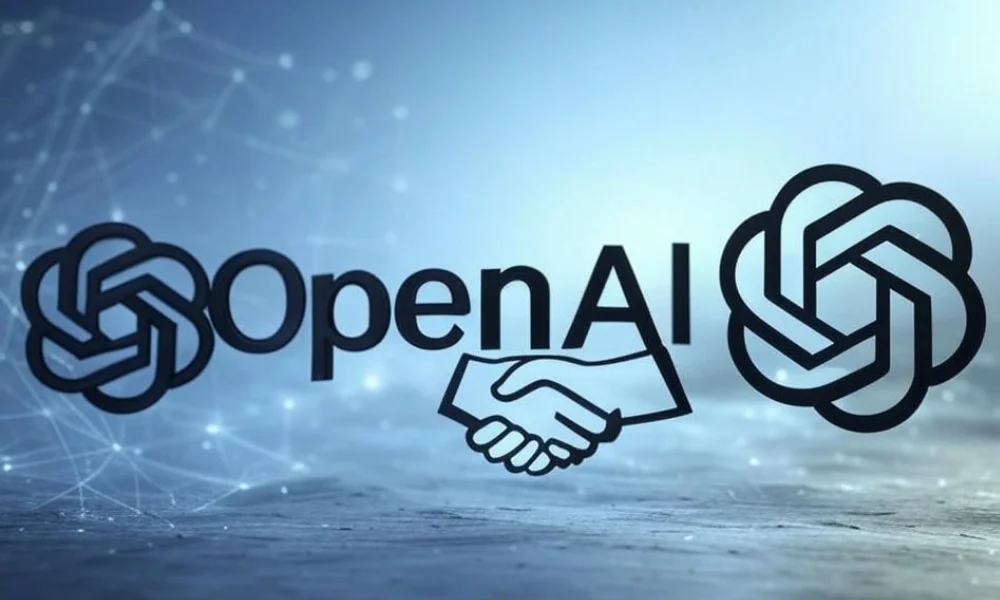Artificial Intelligence
OpenAI and Microsoft Partnership Renegotiation:
OpenAI and Microsoft are reworking their billion-dollar AI partnership to adapt to fast-moving industry changes.
This move could lead to an OpenAI IPO and major shifts in the future of artificial intelligence.

OpenAI and Microsoft partnership has been closely followed by a lot of people, especially me because it has greatly influenced the state of artificial intelligence now. I agree with the people, who think that this deal is one of the most important for AI development. That is why, the latest news on OpenAI and Microsoft Partnership Renegotiation have both interested me likely and you.
Definition:
In essence, the OpenAI and Microsoft renegotiation means that both sides revise, and re-negotiate their first $1 billion AI agreement.
Renegotiations may create how AI works in day to day gadgets like Microsoft Copilot, Word or services like ChatGPT. I’ll simplify the story to the degree that you are taken by the subject but not bogged down by heavy terminology and know what’s at stake and what it might do to the future. You’ll learn about what has changed, what it means for the future of AI, and whether this could lead to an IPO.
The Original OpenAI-Microsoft Deal:
- When OpenAI and Microsoft partnered up for the first time, it was quickly evidenced by focus in tech magazines and leading newspapers. Under a large investment from Microsoft, the partnership was to take OpenAI to the next level on its quest to develop safe and responsible artificial intelligence. At the time, Microsoft committed to creating the specific cloud resources on Azure for OpenAI models.
- Investment meant that OpenAI could pursue its aims, and Microsoft achieved a prize entrance to state of the art AI advances such as GPT-3.Although financial support was important, it was what was done to turn that support into tangible AI technologies, available for businesses and regular folks, that mattered. Synergy of these efforts resulted in the presence of features like Microsoft Copilot, which combines OpenAI’s technology into the productivity apps, like Word, Excel and Teams.
- One of their stand-out elements of their deal was the fact a “capped-profit” was put in place, which differentiated it from the average investments in tech firms. OpenAI preserve its nonprofit status, but created a restricted-profit company for receiving money from Microsoft. On that front, Microsoft received a share of the revenue from OpenAI before sharing further profits, capped.
- By executing this kind of deal, OpenAI was able to retain a desire for responsible initiatives though at the cost of investors looking for high returns. Since Open AI is abuzz and there is an increased level of AI competition, it is quite reasonable that these terms are being refreshed. If we want to understand the current state of affairs, one must ask why OpenAI and Microsoft are amending their agreement now.
Why the Renegotiation is Happening Now?
- I began to start asking myself this question the first time I heard about OpenAI and Microsoft partnership renegotiation. I researched this and found out this is not just a contract revision, it’s a Kick-off that something much larger is changing. OpenAI isn’t quite the small lab that it used to be a few years ago. it’s in a crowded AI race now.
- Pressure on OpenAI increases, and now such corporations as Google DeepMind, Anthropic, Meta, even Elon Musk’s xAI project are first in line. These companies are developing strong models and I believe, OpenAI, knows it has to expand and be smarter in order to lead. That growth requires cash, and the original deal with Microsoft placed restrictions on how much money OpenAI can make.
- A key trigger for this renegotiation is the potential plans by OpenAI to go public by IPO. An IPO would bring OpenAI more funding, and let employees cash on equity that they’ve worked for. However, that move might be made difficult by the current deal with Microsoft if they don’t unpack how ownership and revenue works.
- I also think that Microsoft is also changing, it’s doing its own AI modeling and platforms beyond the technology that OpenAI offers.
Therefore, now, both sides are looking for flexibility, control and space to achieve their own issues in the changing AI market. That’s why such a renegotiation is such a big thing about the reshaping of the future both for companies and for their customers.
What’s Being Renegotiated?
- When I started to delve into the OpenAI and Microsoft deal renegotiation issue, I wanted to find out what is actually changing therein.
The talks are about ownership and profit sharing and how much exposure Microsoft leaves to its powerful technology to OpenAI.This is no minor change, this could totally transform the ways the companies move forward in the future. - One big thing is equity- Microsoft has a lot of it but could change in this new deal. If OpenAI is to go for a public listing, it has to make sure its equity is clean and clear and attractive for future investors and good enough for staff. Currently the capped-profit model prevents profits for OpenAI and I guess they want to make the system more flexible.
- Technology access is also in the conversation. Microsoft has exclusive rights to certain OpenAI models. They may agree to relax or adjust those terms when making this renegotiation in order to provide Open-AI more flexibility. That change would make OpenAI able to license its tools more or create direct business relations without any limits.
- They’re also discussing control, who gets the last word on products, pricing, and partnerships, moving forward. That matters because OpenAI wants to play more of a role in its future, particularly when it’s likely planning to go public soon. In other words, this renegotiation may change their relationship, and provide more room for OpenAI to operate.
Strategic Implications for Both Companies:
- I’ve been wondering what this renegotiation is to mean for OpenAI and even Microsoft. This isn’t just a cash boner, it’s a change in the way both companies operate and work together in the AI space. Let me split that for you from both sides because they have extremely different objectives right now.
For OpenAI:
- OpenAI would like more control, more funding sources on offer and the possibility of future IPO. Renegotiating the Microsoft deal provides OpenAI with free reign to grow with no cap based on their initial nonprofit configuration. Ask me, that freedom allows them to pursue greater objectives, collaborate with more companies and disrupt even more rapidly.
- They also need additional flexibility to compensate their talent, many employees want equity that really increases over time. Having a better way of structure, OpenAI can hire the best engineers and researchers while not losing out to the competition. That’s a lot these days, particularly when so many AI companies are hiring relentlessly throughout the country.
For Microsoft:
- Microsoft wisely made that risk early, but things have changed since that first investment in OpenAI. Now Microsoft develops its own AI tools, and it’s possible that it has become tired of relying solely on OpenAI’s models. This renegotiation allows Microsoft to breathe some fresh air to the deal so as to fit the company’s broader cloud and AI goal.
- simultaneous to this Microsoft needs to defend its position, losing exclusive rights to OpenAI tech might sputter things. But they’ve begun to create their own models, so they are obviously moving toward greater separation. At last, this update about this deal allows both companies to grow without locking them in an old deal.
What This Means for the AI Industry:
- Stepping back, the message to the whole artificial intelligence industry becomes apparent when I look at this renegotiation. That partnerships in AI need to change as the market and the technology change can be proved with OpenAI and Microsoft changing their agreement. This deal may be a benchmark on how others collaborate (or compete) in the AI space going forward.
- A big takeaway from this is that AI startups may, instead, take greater steps towards independence as opposed to full reliance in the big tech area. OpenAI’s will to remodel their partnership may encourage others to try to gain more control over their technology stack. I believe we will begin seeing more flexible partnerships (or outright competition) between research labs and cloud providers.
- This renegotiation also influences the way investors perceive the AI industry and the future vast growth that it may provide. That trend could lead to a flood of investment into other firms seeking to scale in AI if OpenAI heads closer to an IPO. That would make an even greater pressure on such giants as Meta, Amazon, and Google to continue to invest in their AI units.
- We’re also finding out just how important it is for companies to handle their tech, data and business models with caution.AI is on the move, and those deals that worked three years ago might be stifling growth and innovation. That’s why this renegotiation is important – not between two companies, but between every player trying to win in AI.
Could an OpenAI IPO Actually Happen Soon:
- As most of you’ve on a wondering spree, I too wondered if OpenAI is indeed all set to go public shortly. Renegotiation with Microsoft clearly charges that direction, and that is not less for OpenAI that needs more autonomy in financial regime. I think this might be the initial foundation to take OpenAI to become a competitor at the international level that is publicly owned.
- For an IPO to occur, OpenAI needs to streamline its ownership and profit model and that’s probably part of this round of negotiations.
Their current capped-profit-structure was logical in the beginning, but constrains future value to investors and employees. By eliminating or changing those limits, OpenAI could draw more capital and retain its best at its team longer. - A second clue is how OpenAI is hiring people with deep knowledge in business, finance and readiness for public markets. They’re also scaling their commercial products rapidly and that tends to typically indicate a company waiting to unleash greater investor interest. To my mind, these are all indications that OpenAI is an inch away from an IPO – perhaps not tomorrow, but soon.
- Still there are challenges such as governance and public scrutiny and staying focused on AI safety. However as the Microsoft deal changes sides, I believe an IPO has never been more realistic. It’s no longer when, it’s starting to become more of just a when/how.
A Turning Point in AI Business Strategy:
- After this story has unfolded, I truly believe the OpenAI and Microsoft partnership renegotiation is the turning point in AI. It’s not just a case of two tech giants changing, it’s a whole change to the business model of AI that’s unrolling very rapidly. Method used by these companies to adjust will determine how we all use AI in current tools and future inventions.
- For OpenAI, this re-negotiation will be able to open new growth doors, and possibly deliver one of the biggest tech IPOs of all time.
And for Microsoft, it’s an opportunity to reimagine its part in AI, becoming more independent or varied in its approach. This paradigm shift indicates that permanent partnerships need to remain flexible when markets shift, when the goals need to be changed, and when technologies evolve. - What really caught my eye was the way this moment represents a new business approach to AI companies everywhere. They require funding, independence and organization in line with the rate of the technology they’re constructing. That’s why I view this as an update to a contract and as a sign of how future AI companies are going to behave.
Conclusion:
- I’ve covered the partnership between OpenAI and Microsoft from day one, but this renegotiation feels like a new beginning. It’s not news about the business, it’s a reset that may define the future of development and ownership of artificial intelligence. Changes in the pipeline may mean more freedom for OpenAI, newer products for us, and perhaps our very own IPO crawling right up the corridor.
- And for Microsoft this moment is no less significant, it’s a way of correcting its strategy and remaining winsome in the AI race. Either the two companies remain close together or they go their separate ways, either way both companies are certainly gearing up for a future replete and bursting at its seams with new competition. And for me, an AI user, I believe that the change will directly affect the tools and platforms we all use.
-

 Artificial Intelligence8 months ago
Artificial Intelligence8 months agoWhat is Artificial Intelligence? A Comprehensive Guide for Businesses and Enthusiasts
-

 Artificial Intelligence6 months ago
Artificial Intelligence6 months agoHow to Use Grok AI: A Complete Guide
-

 Artificial Intelligence8 months ago
Artificial Intelligence8 months agoUnlocking the Power of Artificial Intelligence Tools
-

 Artificial Intelligence7 months ago
Artificial Intelligence7 months agoWhat is DeepSeek? Revolutionizing AI with Cutting-Edge Solutions
-

 Artificial Intelligence3 months ago
Artificial Intelligence3 months agoAI Technologies in Warehouse Automation:
-

 Artificial Intelligence4 months ago
Artificial Intelligence4 months agoMeta’s AI Push: The Standalone Assistant App Set to Rival ChatGPT
-

 Artificial Intelligence3 months ago
Artificial Intelligence3 months agoHow Artificial Intelligence is Revolutionizing Logistics:
-

 Artificial Intelligence3 months ago
Artificial Intelligence3 months agoPredictive Analytics for Demand Forecasting:



MCP AI
05/19/2025 at 10:20 PM
Dice games thrive on strategy and connection, much like MCP AI’s seamless integration with tools and data. Check out MCP A2A for insights into smart, structured AI development.